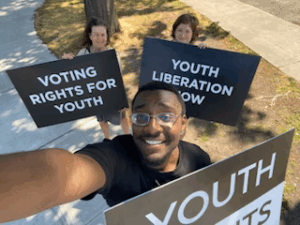Before the Committee on Public Works and the Environment
of the Council of the District of Columbia
Testimony of
Alex Koroknay-Palicz
On behalf of the
National Youth Rights Association
on
Bill 17-88
The Protection and Safety of Underage Persons Amendment Act of 2007
April 18, 2007
I’d like to thank Councilman Graham for organizing the workgroup meetings to discuss this bill over the last few weeks. For the most part they were very productive and I sincerely appreciated the opportunity to participate in them. I echo the wish of others at the workgroup: these meetings shouldn’t stop once this bill is passed. Thanks to the impressive work workgroup, this bill has been improved greatly over the initial draft.
That being said, I am not happy with this bill and the membership of the National Youth Rights Association is not happy with this bill. The focus of this bill is on teens when the focus should be on violence. The focus of this bill is on Taleshia Ford; this bill blames Taleshia Ford for being in the club that day, and it blames Taleshia Ford for getting hit by a stray bullet. This bill blames the victim and all of her peers for a heinous crime, when the person we need to blame is the man who pulled that trigger. The shooter is and was an adult. If this bill was enacted then, it would have done nothing to stop him from being at that club. His stray bullet would have just hit someone else and a different family would now be mourning.
This bill loses sight of what its real goal should be: to stop violence and make our clubs safer for all people. The one part of this bill that does address violence directly is the requirement that clubs submit a security plan and obtain proper training for their security personnel. This is a wonderful idea and most people at the workgroup were supportive of it.
My issue with it, however, is it does not go far enough.
At the workgroup meetings, the majority of those present reached the conclusion that only a handful of clubs would apply for this underage endorsement, many of whom being clubs that are safe venues to begin with. The unsafe venues will, no doubt, just impose an 18-year-old limit and avoid the security plan requirement altogether. This inevitability was laughed off at the meetings, but this is the central weakness of this bill. The dangerous clubs won’t have their security plans monitored, and the safe clubs will.
There is something intrinsically wrong with that.
At several points during the workgroup meetings I, and others, suggested that we should simply require ALL clubs submit a security plan. Each time that was suggested, I noticed many nods of approval and even a few fist-pumps from the people around the table in agreement, yet this suggestion was seen as a distraction from this bill and never allowed to be discussed in depth.
I think this is exactly what we should be discussing. Violence at clubs is a problem that affects all people regardless of their age. One dead 18-year-old is no better than one dead 17-year-old. I believe it was the representatives from Peaceaholics who pointed out that having properly trained security personnel at the clubs is one of the best ways of defusing violent, confrontational situations. If this is such a good solution, why limit it to a handful of clubs that apply for an underage endorsement?
All clubs – regardless of the age of their patrons – should submit a security plan.
If we do that, we would be, in effect, requiring all clubs in the city to get an underage endorsement and there would no longer be a need for the 18-year-old age requirement. All clubs would be treated the same.
A key benefit of this is it covers cases where teens under 18 sneak into clubs without the underage endorsement. This is the danger a two-tiered system creates. If we are going to legislate a class of safe clubs and a class of dangerous clubs, teens will somehow, someway, find a way into those dangerous 18 and over clubs who don’t have to submit a security plan. If all clubs have trained personnel at the door, then this is much less of a worry.
Finally, I’d like to end by pointing out the lack of youth input into this process. The workgroup meetings were wonderful, but there was no representation by those who this bill seeks to govern the most: teens under 18. The only semblance of “youth” present were from my organization, the National Youth Rights Association.
Whether it is this bill, or our schools, or the curfew, or any other issue that affects the daily lives of youth – their voice is not listened to when it should be the most important. There has not been enough effort to bring their voices into government and there has not been enough good faith to listen to their voices when they do speak. It is my hope that DC can follow the example of countries like Austria and Brazil and truly apply their slogan of “Taxation without representation” by lowering its voting age to include young people in this process more directly.
Perhaps then we could get down to the real business of making our city safer for all people – regardless of age – instead of proposing bills that distract us from that worthy goal by punishing teens for the crimes of adults.






Good job, Alex.